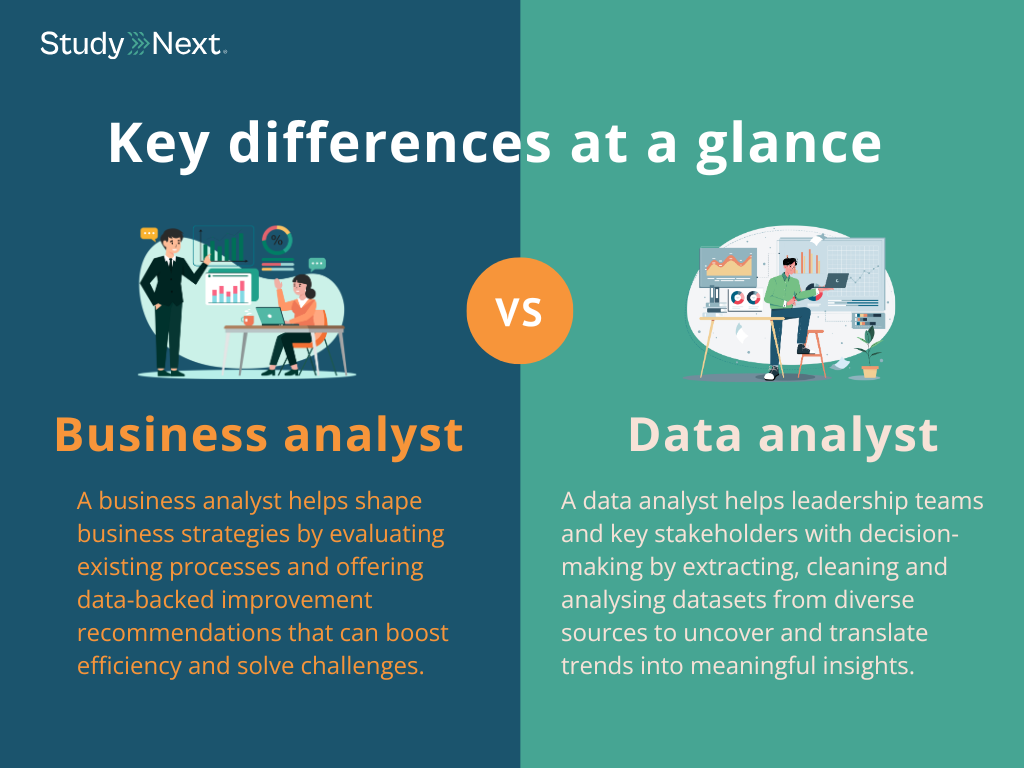In This Article
- Business analyst vs data analyst: roles and responsibilities
- Business analyst vs data analyst: salary
- Business analyst and data analyst qualifications
- Should I become a business analyst or data analyst?
- Key differences between a business analyst and a data analyst
- Explore courses in business analysis and data analysis

Although business analysts and data analysts share similar titles and occasionally overlapping tasks, their roles are far from identical. While both roles involve analysing data, their focus, skill sets and career paths can be quite distinct.
Read further to explore the main differences between the two roles, including key responsibilities, educational requirements and potential salaries, to help you decide which path to choose.
Business analyst vs data analyst: roles and responsibilities

What does a business analyst do?
A business analyst identifies organisational needs, assesses current processes and recommends data-driven improvements that can drive meaningful business outcomes. They typically collaborate closely with a diverse range of stakeholders, including managers, subject matter experts and IT teams, to gather and define requirements, develop actionable plans and implement strategies to improve business performance.
Key responsibilities
Collecting business requirements
The business analysis journey begins with a deep understanding of an organisation's needs to ensure that the proposed improvement addresses specific challenges and aligns with company goals. This also involves collecting information from a variety of sources, including interviews, surveys and historical data. Gathering business requirements is a core responsibility of a business analyst, as this data is used to extract meaningful business insights.
Evaluating data
A business analyst transforms data into actionable insights by identifying patterns and trends through techniques like descriptive analysis, predictive modelling and data cleansing. These insights are crucial for evaluating current business performance and finding operational challenges or inefficiencies. Beyond internal data, this professional may also analyse market trends and emerging industry developments to give organisations the foresight needed to get ahead.
Identifying potential improvements
A key responsibility of a business analyst is finding opportunities to enhance operational efficiency. This professional often finds ways to streamline processes, cutting unnecessary costs and identifying new revenue streams. Their insights drive innovation and support a culture of continuous improvement, ensuring the business stays competitive in the market.
Preparing reports
A business analyst communicates their findings and recommendations to senior management, clients and executives through reports. This involves organising data into concise and visually engaging formats using charts, graphs and other visual elements. These reports usually highlight operational insights, opportunities and challenges, empowering stakeholders to make informed decisions and shape effective strategic plans.
What does a data analyst do?
A data analyst uses their statistical expertise to examine and interpret vast amounts of data from diverse sources. Their main role is to uncover patterns, find emerging trends and utilise data to drive strategic decisions. They can also provide valuable insights into market and industry trends, helping businesses discover untapped markets and revenue opportunities.
Working with a team of analysts, they gather information, analyse data and present their findings in detailed reports to senior management. By translating data into meaningful insights, they enable executives to make decisions that are backed by data, which can contribute to business success.
Key responsibilities
Managing databases
A data analyst is responsible for operating and maintaining databases, whether for specific business areas or across the entire organisation, ensuring the data remains accurate and easily accessible. This often includes transforming raw data into a structured format, adding new information and ensuring that data sets are up-to-date and ready for analysis.
Analysing data
This professional dives into large data sets using analysis and statistical modelling tools to identify trends, patterns, risks and growth opportunities. They turn complex numbers and raw data into findings that can not only answer key business questions, but also drive impactful decisions.
Creating reports
Drawing from in-depth analysis, a data analyst prepares reports tailored to various stakeholders. These reports can highlight patterns and forecasts in diverse business areas. Along with these reports, they can also provide detailed documentation that helps stakeholders understand the data and the methodology behind the analysis.
Ensuring data compliance
A data analyst ensures that data is handled ethically. They’re also proactive in keeping up with the latest regulations, such as data privacy laws, making sure that all data practices are compliant and secure.
Business analyst vs data analyst: salary
Business analyst salary
According to SEEK, the average salary of a business analyst ranges between $105,000 to $125,000 a year. With business analysis playing an increasingly critical role in organisations across various industries, business analyst roles in Australia are projected to grow by 23.2 per cent over the next five years.
Besides experience, your salary can also be determined by where you choose to work. The following are the average salaries according to each state and territory across Australia:
- Australian Capital Territory: $116,000
- Victoria: $115,000
- Western Australia: $115,000
- New South Wales: $114,000
- Queensland: $106,000
- Northern Territory: $106,000
- Tasmania: $100,000
- South Australia: $98,000
Interested to learn more? Read our full guide to business analyst salaries here.
Data analyst salary
Data analyst salaries also depend on work experience and location. SEEK reports an annual salary between $90,000 to $110,000 on average in Australia. Similar to business analysts, data analysts are in great demand, with a projected job growth of 23.2 per cent within the following five years.
Discover their average salaries in each state and territory:
- Tasmania: $125,000
- Victoria: $102,000
- Australian Capital Territory: $101,000
- Queensland: $100,000
- South Australia: $98,000
- New South Wales: $97,000
- Western Australia: $91,000
- Northern Territory: $85,000
Business analyst and data analyst qualifications
How to become a business analyst
A business analyst qualification typically begins with a bachelor’s degree, giving you the fundamental skills and knowledge you need. You can pursue your degree in business administration, business analytics, IT, computer science or a related field. This qualification will arm you with essential skills in data analysis and reporting, while also honing your problem-solving and critical thinking abilities. This usually takes you three years of full-time study.
It’s also highly recommended for you to be familiar with the BABOK Guide, published by the International Institute of Business Analysis (IIBA). This globally recognised resource covers the essential skills, knowledge and best practices every business analyst should know. As the go-to standard, knowledge of the BABOK Guide can significantly elevate your expertise and make you an even more valuable asset to employers.
You also need to have practical experience to complement your academic knowledge. With your bachelor’s qualification, you can gather industry experience by taking on internships or entry-level roles like junior business analyst or operations executive. Since business analysts often specialise in sectors like healthcare, finance or technology, you should familiarise yourself with industry-specific practices to increase your chances of landing a business analyst role in your preferred field.
Take your career to the next level by pursuing a master’s degree, which is a powerful way to boost both your credibility and employability. Leading Australian universities offer a range of master's courses that can teach you advanced knowledge of business analysis tools, techniques and strategies. Beyond academic knowledge, these programs can also provide excellent opportunities for professional development.
For example, La Trobe University’s Master of Business Analytics is designed to equip you with expertise in various industry-standard software such as PowerBI, SAS and Excel. You can also apply for internship opportunities with major organisations such as IBM, PwC and NORTH Link. On the other hand, the Master of Business Analytics course at Torrens University Australia offers the option to combine the program with other courses such as the Master of Business Administration or Master of Business Information Systems, expanding your skill set even further.
Discover more master’s degrees in business analytics below.


La Trobe's accredited Master of Business Analytics will keep you ahead of the trends. Gain advanced skills in business, programming and data engineering and update your knowledge as you grow in this fast-moving industry.
In this practical course, you'll take your career to the next level as you learn the latest tools from industry experts. Learn industry-standard programs, including SAS, Power BI, IBM Cognos, Excel, SQL and R and understand how to develop data-driven solutions for real-life business problems. You'll also gain high-level skills when you choose a specialisation in your area of interest, including artificial intelligence, data science, digital health and more. Graduate with your specialisation on your academic transcript so that future employers can recognise your expertise.
Study a degree recognised by industry. La Trobe's Master of Business Analytics is one of the few courses in Australia where you'll graduate with a Certificate in Business Analytics from SAS.
I'd like you to please understand the complexity of business needs and learn how to solve them with data-based solutions. You'll learn the highly sought-after skills required to bridge the gap between analytics and non-analytics professionals and craft innovative solutions for a wide range of businesses and organisations.
Learn from world-class academics and be immersed in research at La Trobe's Centre for Data Analytics and Cognition (CDAC). The CDAC staff also teach in the Master of Business Analytics program and collaborates with international research groups to develop industry-leading research in artificial intelligence and advanced analytics.
Grow your professional networks by connecting with industry leaders at SAS and Microsoft. You'll also have the opportunity to build your professional experience and apply for a voluntary internship with leading organisations like PwC, IBM, NORTH Link and Coles.


A Master of Business Analytics advances your ability to convert data into insights and solutions. In this multi-disciplinary course, you'll master the analytical lifecycle, diversify your career path and deliver data-driven business and social solutions.
Contemporary technologies and communication techniques will also be examined to build your data and analytical capabilities along with your ability to converse with expert and non-expert stakeholders. Ultimately, you will learn how to elicit business requirements and recommend analytical solutions that seamlessly embed within business flows. The unique course design also provides the ability to link into other study opportunities for further career development, including a Master of Business Administration or Master of Business Information Systems.


Through an intensive one-year program, you will learn how to define and structure business problems, use data to provide insight and communicate those insights to senior leaders. A personal effectiveness component will also develop your skills in areas such as teamwork, negotiations and ethical decision-making.
Graduates of this program are developed to be exceptional from both a technical and business perspective.


The Master of Business Analytics equips students with the analytical skills needed to extract meaning from complex data sets, the ability to converse with other technical experts (such as computer scientists) and the capacity to make meaning of the output.
This business expertise is highly sought after in the global workplace.


The Master of Business Analytics is a unique transdisciplinary program of study in business analytics. With subjects drawn from UTS Business School, the Faculty of Engineering and Information Technology and the TD School, students are provided with a course structure that fits their background and experience, as well as flexible specialisations to meet new needs and career interests.
How to become a data analyst
A data analyst qualification often starts with a bachelor’s degree in a field like data analytics, data science, business analytics, mathematics, economics or a related discipline. Your undergraduate studies can give you a foundational understanding of data analysis, introducing you to topics like predictive modelling, statistics and machine learning. You’ll also get practical experience with key data analysis tools and languages such as Python, SQL and JavaScript. Earning a bachelor’s degree in these fields typically takes around three years if you’re studying full time.
After graduation, you'll likely start in a junior role where you’ll get hands-on work experience managing data. These positions will give you the chance to put your academic knowledge into practice while honing your skills with industry-standard tools and software. You’ll also have the flexibility to work across a variety of industries as data is an invaluable asset for businesses in nearly every sector.
Besides accumulating valuable work experience, you can accelerate your career by pursuing a master’s degree to increase your chances of stepping into more senior analyst roles. There are numerous postgraduate data analytics programs designed to refine your skills and deepen your technical expertise. Many universities also offer unique features to enhance your learning experience, giving you a competitive edge in the world of data analysis.
The Master of Data Analytics program at Bond University provides access to exclusive facilities such as the Bond FinTech Hub, where you can get a Bloomberg certification. The Centre for Data Analytics also offers opportunities to work with industry experts. Meanwhile, as a student of the Master of Analytics course at the University of New South Wales (UNSW), you can choose to specialise in Human Resource Analytics or Marketing Analytics to customise your course plan according to your career aspirations and interests.
Explore more data analytics courses for master’s students below.


The Master of Data Analytics is delivered via smaller classes, providing personalised support and unparalleled access to Bond University's Bond Fin Tech Hub and Bloomberg data-sourcing terminals. This program focuses on strategically sound recommendations and data-driven business decisions.
As a Bond Business School student, you'll have access to exclusive facilities, including the Bond FinTech Hub, where you can gain Bloomberg certification and the Centre for Data Analytics, offering unparalleled opportunities to work with experts in the field. Through the program’s comprehensive curriculum, you will be prepared to meet the growing demand for data-driven expertise and make a substantial impact in your chosen industry.
The program's flexible structure allows students to specialise in key areas such as Accounting Analytics, economic modelling, Health System Analytics, Marketing Analytics, Psychometrics, Quantitative Finance, or Sports Analytics.


The online Master of Analytics program is designed for ambitious working professionals that are looking to develop advanced analytics capabilities and apply data-driven decisions. This program provides students with the expertise to influence business decisions, leverage career opportunities and gain skills that can be applied across all industries.
UNSW’s Master of Analytics is delivered online and accelerated so you can graduate in as little as two years without compromising your career.


Please note that some of the courses specified in the Master of Applied Data Analytics program will not be offered in intensive mode in 2024 and, depending on enrolments, may not be offered in intensive mode in 2025 either. Students must complete the approved alternative courses listed below on campus, in standard semester schedules, which may include in-person examinations and tutorials.
- COMP8910 Data Mining (Intensive) replaced with COMP8410
- COMP8930 Data Wrangling (intensive) replaced with COMP8430
- COMP7240 Introduction to Database Concepts (intensive) replaced with COMP6240
- COMP7230 Introduction to Programming for Data Scientists (intensive) replaced with COMP6730
- COMP6990 Document Analysis (intensive) replaced with COMP6490
- COMP8920 Neural Networks, Deep Learning and Bio-inspired Computing (intensive) replaced with COMP8420
The Master of Applied Data Analytics is a 1.5-year full-time (or equivalent part-time) degree that provides students with:
- Exposure to best practice in data analytics.
- Cutting-edge courses in areas of relevance to data analytics practitioners.
- An opportunity to deepen knowledge in one of the three areas of computation, statistics, or social science.
- Professional development for practising data analytics professionals.
- The opportunity to undertake research of professional relevance.
The program is taught in semester mode and for domestic students, the program is also offered in intensive blended mode. Students studying in an intensive blended mode are expected to be enrolled part-time. The intensive blended course delivery mode is designed to suit working students who take leave from work (or other commitments) to attend an intensive 1 week of full-time learning on campus in the middle of the course and study remotely for the rest of the course. The intensive blended course delivery mode comprises: 4 weeks of online study, one full-time week of face-to-face learning on campus and a further 4 weeks of online study.


The Master of Analytics builds on the tradition of statistics and operations research, bringing together tools and expertise from computer science, engineering and business.
This blend of disciplines makes analytics unique in its capacity to solve critical real world problems. You will learn how to use data to make informed decisions that make significant contributions to the success of organisations, which provides a rewarding and valued career path.
This degree allows you to choose from a diverse range of electives combined with a strong core of statistics and operations research.


With this online master’s degree, you will extend your expertise in analytics and gain critical knowledge and skills required to make informed business decisions using complex data.
You will gain foundational knowledge in Python programming and data modelling while completing specialist units in accounting analytics, data visualisation, and data science. As part of your degree, you will also have the opportunity to undertake online elective units to broaden your professional development or specialise further across various areas.
This course is ideal if you want to gain specialised knowledge in analytics or formalise your work experience with a degree from a leading global university. As a graduate, you will have the knowledge and skills to work across multiple sectors and industries. This degree will ensure you’re ready to work in a rapidly changing business environment.
Should I become a business analyst or data analyst?
If you prefer finding solutions to business needs, becoming a business analyst may be ideal. If you enjoy analysing data and extracting insights to inform decision-making, you should consider a career as a data analyst.
Choosing which career path suits you also depends on the kind of work environment you see yourself thriving in and other factors. Below are several questions you can ask yourself to help you decide:
What are your interests?
If you thrive on solving complex business challenges and enjoy optimising processes, you should consider becoming a business analyst. This role focuses on the big picture of business strategy and you’ll be working with various stakeholders to ensure your improvement plans align with organisational objectives.
On the other hand, if you’re more interested in numbers and examining data for meaningful patterns, a data analyst role may suit you better. You’ll get to work with statistical models and dive deep into quantitative data to turn figures into valuable insights.
What do you want your day-to-day work to look like?
While both business analysts and data analysts work with data, their daily activities and focus areas are quite different.
Business analysts spend a lot of their time in meetings, engaging directly with diverse stakeholders to understand their pain points and gather business requirements. They review business processes, identify areas for improvement and suggest strategies to optimise operations. These professionals also collaborate closely with IT teams to ensure that technical solutions align with business objectives.
Meanwhile, data analysts are more focused on data collection and analysis. They work with stakeholders to understand what kind of insights are needed before diving into the data using advanced analysis techniques. Once they've extracted valuable insights, they generate reports that empower decision-makers with the data they need to make informed choices.
What kind of environment do you want to work in?
Both business analysts and data analysts typically work in office environments and have the flexibility to explore a wide range of industries. However, the key distinction lies in how they collaborate with others at work.
Business analysts thrive in a collaborative environment, frequently engaging with various teams to streamline processes, solve problems and align business goals. In contrast, data analysts often focus on more individual tasks, including data processing, data analysis and creating reports. While they may occasionally collaborate with stakeholders to understand specific data requirements, their work is more independent and focused on obtaining data-driven insights.
What are your strengths?
Your personal strengths can also be a guide in choosing the right career path. If you're great at communicating with diverse people and finding ways to solve business challenges, a business analyst role could be the right fit for you.
Alternatively, if you’re passionate about numbers, have strong technical skills and thrive on digging into data to uncover patterns and insights, you should consider becoming a data analyst.
Which path should you choose?
The right career path depends on what excites you the most and can bring out the best version of yourself. If you're passionate about guiding business strategy, you may thrive in a career as a business analyst.
On the other hand, if you enjoy working closely with data and have strong technical skills to back you up, becoming a data analyst may be the ideal choice for you.
Key differences between a business analyst and a data analyst
| Category | Business analyst | Data analyst |
|---|---|---|
| Roles and responsibilities | Determines business needs, analyses existing processes and proposes improvement plans to enhance business performance. | Gathers, processes and interprets data for meaningful insights that can influence business decision-making. |
| Salary | Usually makes between $105,000 and $125,000 annually in Australia. | Typically earns between $90,000 and $110,000 per year in Australia. |
| Qualifications | A bachelor’s degree in business administration, business analytics, IT, computer science or a similar field. | A bachelor’s degree in data science, business analytics, mathematics, economics or a related discipline. |
| Work environment | Can work across diverse settings, including large corporations and small to medium-sized companies. Often collaborates with various stakeholders to discuss and shape business strategy. | Works in a variety of environments, from major companies to smaller businesses. Typically works more independently with data to uncover insights. |
| Skills | Requires strong analytical and critical thinking skills to examine business processes as well as communication skills to engage with stakeholders and facilitate collaboration with cross-functional teams. | Requires technical expertise to collect and analyse data, such as data visualisation, data wrangling, statistical analysis and programming languages like Python and SQL. |
Explore courses in business analysis and data analysis
While business analysts and data analysts play a vital role in guiding business decisions, their roles differ according to the scope of their responsibilities. Business analysts focus on the broader strategic direction of an organisation, while data analysts dive into data to extract insights that can shape those strategies. If you’re interested in pursuing a career in either field, furthering your studies can help equip you with the skills and knowledge you need to succeed. Discover a wide range of business analytics and data analytics postgraduate courses available in Australia.



















